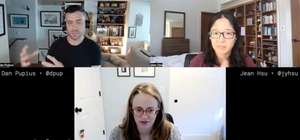In this episode of Lead Time Chats, Jean Hsu, VP of Engineering at Range, chats with Kate Heddleston, Senior Engineering Manager at Samsara, about how to manage burnout on your engineering team.
Kate and Jean discuss:
- What is burnout, and what does it look like in its early stages
- How to talk to teammates about activities that energizes or drains them, to mitigate or relieve burnout
- Giving team members permission to work flexibly and create effective conditions for creative work
- Leveraging other factors to engineering speed (not just hours worked)
Takeaways from Kate
Early stages of burnout can look different for different people
“Burnout is a state where you are emotionally exhausted. It comes from being in a state of heightened emotional duress to the point where your body can no longer maintain that. Your body and brain don't want to do it anymore. You're just tired, mostly emotionally, but sometimes physically. It looks like a lack of engagement, it looks like a lack of apathy — at its most extreme, it starts to look like depression. For me, I cry a lot more easily. So I go back and forth too, between being anxious and then feeling just completely overwhelmed and unmotivated. So for people that can look like a lot of things, and then the early stages of burnout, or basically pre-burnout is kind of like almost a heightened state of being amped. And it can look like being stressed, but it can also look like being excited.”
Pay attention to what energizes or drains teammates
“Things that give you energy are usually things that you enjoy doing, things that you're excited about. Things that drain your energy are usually indicative of stressors, areas where you're not motivated, areas where you don't have a high level of interest.
And when you start to ask about what things are draining energy, you'll start to notice certain stressors that exist for people that are draining them. People that you manage are like all across the spectrum of sensitivity, to certain things. We all come with our little backpacks of personal issues.”
Senior contributors are particularly susceptible to burnout
“A lot of times people who are burning themselves out are a few years into their career. The reason they're overwhelmed and have so much on their plate is they're a valuable employee and people keep giving them work. So your best employees tend to be like highly likely to burn out. I would rather have six hours, six focused hours, which is a lot of a senior engineer's time, than I would like 10 hours of scattered time.
That's one of the narratives that I spend a lot of time undoing and had to undo in myself, which is we just have this idea that more is more, like more hours, and more work. And I'm like, actually less, do less. I would rather have you do less and do it well. And people have a hard time with that.”
Give people permission to work flexibly, not just log hours at their desk
“I give you permission to have empty hours during your day. I give you permission to walk around your apartment and not have eight hours of optimized time at your desk. We do creative work. It's not linear. If you're stressed and you're not making progress and going for a walk and getting lunch is the best thing for you, you should do that.
If taking a nap in the middle of the day is best thing for you, you should do that. The only advantage of COVID is that we have flexibility. You might as well use it. But it's interesting how much permission and how much work it takes to undo this narrative that we have to be working a certain number of hours a day.”
Leverage factors like clarity, focus, and scope for engineering speed
“Slow is smooth, and smooth as fast. I see so many inefficiencies in engineering, and almost none of them have to do with how hard the engineers work. Building the wrong thing — really expensive, takes a ton of time. There's a couple of levers for speed in engineering. Clarity, so understanding what you're building is one of the biggest levers to speed. So when engineers are given really nebulous tasks with a ton of competing requirements and no clear goals it's going to take a long time to build.
So paying that down that has nothing to do with actual dev time. Paying that down actually is huge for speed. Another one is focus — doing less is always faster. And then scoping — doing less is always faster.”
Enjoy Lead Time Chats?
Please leave us a rating or review on iTunes! It'll help these chats get in front of more engineers and leaders like yourself.
Don't miss any episodes!
- Subscribe to the Lead Time Chats podcast on Apple, Spotify, or wherever you listen to podcasts, so you don’t miss any episodes.
- Join Lead Time Community, where we'll post new Season 2 episodes weekly. Lead Time Community is a place to connect, share, and grow with other engineering leaders.
About Lead Time Chats
Listen in on unscripted conversations between Jean Hsu, VP of Engineering at Range and engineering leadership coach, and engineering leaders and other influential folks in tech.
Lead Time Chats is brought to you by Range. Range helps hybrid teams check-in asynchronously about what matters most. Know what's happening through status updates that pull from tools like Github and JIRA without scheduling yet another meeting.
Checking-in with Range creates more focus time for heads-down work, all while feeling a deeper sense of connection and belonging with your team. To learn more about Range, you can check it out here.
Season 3 Episodes
» Episode 1: Jen Kim on how startups can hire better
Season 2 Episodes
» Episode 1: Camille Fournier on making boring plans
» Episode 2: Tess Rinearson on early career engineering managers
» Episode 3: Kim Scott on building for systemic justice
» Episode 4: Sumeet Arora on moving on from a big company
» Episode 5: Rachael Stedman on IC manager work
» Episode 6: Chris Bee on Behaviors of Effective Eng Leaders
» Episode 7: Lynne Tye on the Engineering Hiring Landscape
» Episode 8: Beau Lebens on Distributed Team Meetups
» Episode 9: Indrajit Khare on Getting Acquired by Google
» Episode 10: Jack Danger on Technical Debt
» Episode 11: Sarah Milstein on Successful Remote and Hybrid Teams
Season 1 Episodes
» Episode 1: Will Larson on the path of the senior engineer
» Episode 2: Duretti Hirpa on mentoring junior and mid-level engineers
» Episode 3: Cate Huston on working with an external coach
» Episode 4: Juan Pablo Buriticá on common eng manager mistakes
» Episode 5: Gergely Orosz on the decision to go into management
» Episode 6: Lara Hogan on leading effectively in a pandemic
» Episode 7: Kaya Thomas on common early career engineer challenges
» Episode 8: Uma Chingunde on starting a VPE role in a pandemic
» Episode 9: Katie Wilde on supporting your team's mental health
» Episode 10: Akhil Gupta on navigating uncertainty in new roles
» Episode 11: Harper Reed on giving everyone a voice in team meetings
» Episode 12: Marc Hedlund on sponsorship








